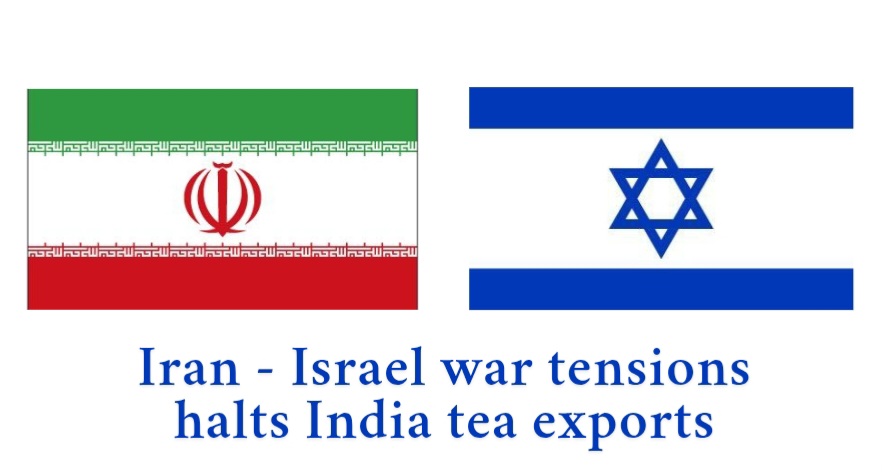India suspends Tea Exports to Iran amid rising geopolitical tensions in the Middle East escalate, especially because of the growing conflict between Iran and Israel, India has banned all of its tea exports to Iran. India’s tea sector, international trade channels, and economic ties with Iran will all be significantly impacted by this decision, which was motivated by mounting security concerns and logistical problems.moneycontrol.com
Understanding the Root of the India-Iran Trade Dispute
The threat to regional stability has increased due to military escalation, cross-border strikes, and diplomatic breakdowns in the ongoing Iran-Israel confrontation, which has taken a dramatic turn in recent months. The safety of maritime trade via critical channels, such the Red Sea and the Strait of Hormuz, which are both essential for international shipping, including India’s tea exports, has come under scrutiny as a result of this conflict.
The Indian government has decided to temporarily stop sending tea to Iran while keeping a careful eye on the issue. Officials stated that possible insurance and freight issues, as well as security concerns for both persons and cargo, were the main causes of the suspension.
Iran: A Strategic Export Destination for Indian Tea
Iran is renowned for importing premium orthodox tea and is one of the biggest buyers of Indian tea. It is the second-largest market for Indian tea exports, after Russia. Exports to Iran had started to rebound in recent months following a decline in 2023 brought on by sanctions and payment problems. For Indian tea producers, particularly those in West Bengal and Assam, this resurgence was viewed as encouraging.
However, this comeback has been hampered by the most recent export embargo. Large volumes of tea shipments, especially from Kolkata, are reportedly currently stranded in Mumbai’s Nhava Sheva port, pending clearance or rerouting. Potential losses from delays, storage fees, and the possibility of tea losing its freshness over time are worries for exporters.
Assessing the Economic Impact on India’s Tea Industry

At a time when the Indian tea sector is already struggling with growing production costs, competition from nations like Kenya and Sri Lanka, and shifting global demand, exports have been halted. Uncertainty is increased by the lack of access to the Iranian market.
Using the rupee-rial trade mechanism, many tea exporters had positioned their inventory especially for Iran, taking into consideration its payment structure and taste preferences. Due to the disruption of this channel, small and medium-sized exporters are especially at risk.
In reaction to the crisis, freight and insurance charges have also increased, impacting trade with other West Asian nations as well as North America, in addition to shipments to Iran. In order to offset rising costs, exporters are also pleading with the government to offer logistical assistance, such as alternative shipping routes or subsidies.
Government Response to Industry Challenges
The issues brought up by tea exporters have been acknowledged by India’s Ministry of Commerce and Industry. The industry has been reassured by officials that they are actively evaluating the issue and collaborating with stakeholders to find potential solutions. These could consist of:
• Looking into alternate, secure shipping routes
• Offering impacted exporters financial assistance or relief packages;
• Taking part in diplomatic initiatives to restore safe trade lanes
In order to predict possible losses and evaluate inventory levels, the Tea Board of India has already started consulting with exporters and trade associations.
Broader Implications
The brief export suspension highlights how susceptible commodity-based trade is to geopolitical disputes. Even though it’s frequently regarded as a reliable export, tea is not an exception. The disruption also calls into question India’s agricultural exports’ diversification, both logistically and in terms of markets.
The circumstance also emphasizes the necessity of robust trade frameworks that are resistant to shocks of this kind. To lessen the effects of similar incidents in the future, nations like India might need to make greater investments in safe and varied trade routes, digital shipment tracking, and adaptable export plans.
The Road Ahead for Indian Tea Exports to Iran
A clear reminder of how international tensions may have a direct effect on domestic industry is India’s decision to stop sending tea to Iran in the midst of the escalating Iran-Israel crisis. Although safety is the top priority, the decision presents significant obstacles for the tea industry, impacting trade income and livelihoods. As the government and industry stakeholders collaborate to identify short-term fixes and long-term plans to deal with this problem, the upcoming weeks will be critical.
For more such business information related to India stay connected with us on moneypistol.com


